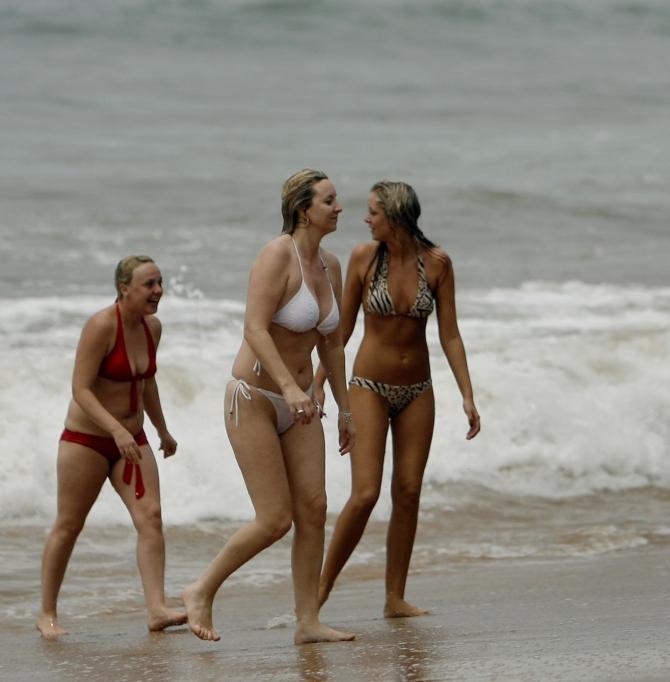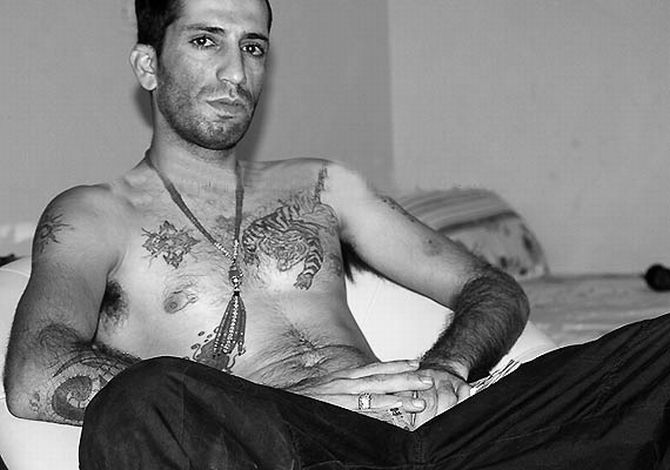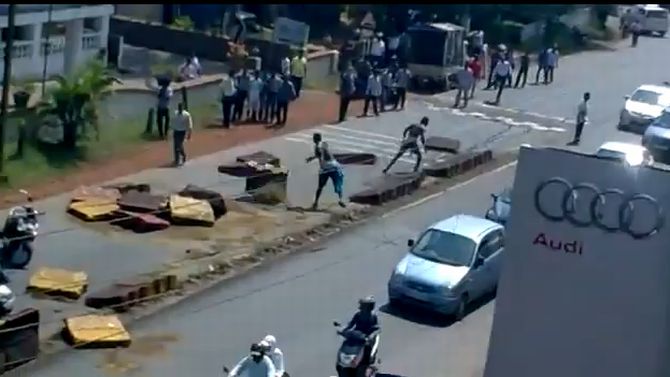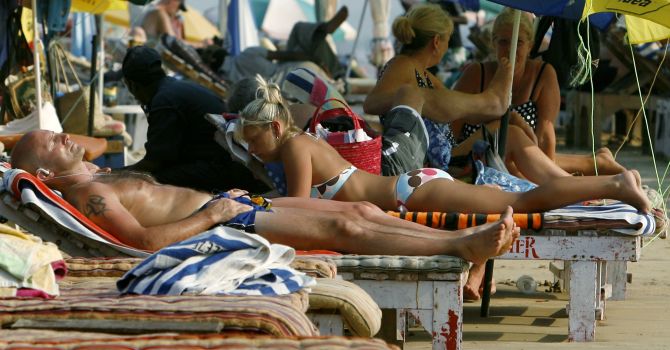 | « Back to article | Print this article |
INSIDE REPORT: Sun, sand and the shady drug cartels
The Goan paradise has become one of the world’s most powerful drug cartels, which is being operated by Russians, Israelis and Nigerians -- in their own distinctive styles -- and is backed by local political interests. Vicky Nanjappa’s special report.
There’s no doubt that Goa is a favourite tourist destination. However, it’s also a known fact how shady drug lords control this paradise. The recent murder of Obina Paul, a Nigerian international, in North Goa, has triggered a series of protests and this in fact has even led to a diplomatic row between the two countries.
The coastal state has one of the most powerful drug cartels in the world, mostly controlled by Russians, Israelis and Nigerians. According to sources in the anti-narcotic cell, the Nigerians drug lords are growing in strength.
An anti-narcotic officer tells rediff.com that their main areas of operation in Goa are Calangute, Anjuna, Arambol and Morjim. Nigerians control the cocaine market in Goa, while the Russians and the Israelis deal with marijuana, charas and ecstasy.
The ongoing diplomatic tension with Nigeria is not the first time that the Goan drug cartels are being spoken about so openly in the media. Investigations in the rape and murder of British teenager Scarlett Keeling hinted towards the involvement of the drug mafia. Five years on, the case remains unsolved.
Please click NEXT to read further...
'Drug trade in Goa is worth Rs 6,000 crore per year'
However, the biggest pointer to the drug trade in Goa was when a video of Yaniv Benaim Atala, the most powerful Israeli drug lord, went up on the Internet. This was a video that was posted by his girlfriend in which he was seen speaking about drug operations in Goa. He also spoke about the manner in which the Goa police and top politicians were hand in glove with the drug cartel. This led to the arrest of several policemen.
The arrest of Ashish Shirodhkar, an inspector at Anjuna, revealed how the nexus exactly works. The dealers first supply drugs to foreign tourists and then give out information about them to the police. The police in turn conduct the raid and demand huge sums of money in dollars. They are then handed out an immunity which in turns allows the drug peddlers to trade without the fear of getting caught.
Anti-narcotic cell officers, who work in Goa, say that this is a very lucrative business. The officer tells rediff.com that drug trade in Goa is worth Rs 6,000 crore per year. The cartel is controlled by the men from Israel, Russia and Nigeria and most of the drugs are sourced from Afghanistan and Pakistan.
All the drugs land in an unmanned area of a Goan coast. Most of these coasts still remain unprotected unlike the rest of the coasts in the country which have stepped up operations after the 26/11 Mumbai terror attacks. According to investigations, nearly 90 per cent of the drugs arrive by sea while the rest are brought in mainly by the Russian mafia in chartered flights.
Officers say that it is not too difficult to fight this mafia but the politics behind it is the real problem. There are several legislators with whose blessings these cartels function, the officer notes.
The biggest draw for drug cartels are rave parties and this is where most of the drugs sell. Rave parties normally organised on beaches have the protection of local legislators. “Take for instance a temple that was built by one legislator at Anjuna. Several rave parties were organised at Anjuna, and believe it or not, the drugs were being supplied behind the temple over a proper counter,” the officer says.
In this context it would be interesting to take a look at the Francisco Pacheco legislative committee report on drug trade. It clearly states that there was enough to show that the son of the former home minister of Goa was involved in the drug trade, along with a director general of police.
Please click NEXT to read further...
'Fearing crackdown, Nigerians may have stage-managed the protests'
Officials say that despite the rise of the Israelis and the Nigerians it is the Russians who still control most part of the drug trade. However, the recent raids in the northern parts of Goa like Morjim and Arambol have indicated the rise of the Nigerians. Around 18 raids that were conducted in last year exposed at least 30 drug peddlers -- all from Nigeria -- operating in North Goa. What was more ironic was that the police also found that many Nigerians who were peddling drugs were over staying in Goa even after their visas had expired.
Over the past couple of weeks the Nigerians are clearly under pressure. “There is expected to be many more crackdowns on this front and they would be chased down”, says a minister from Goa.
“The Nigerian drug cartel was aware of this development and could have well stage-managed the murder of Obina Paul to ensure that this led to protests and later a diplomatic tussle,” a police officer in North Goa reveals.
“Obina Paul is said to have been one of the moles who informed the narcotic cell leading to a seizure of drugs worth Rs 1 crore. The drug cartel had faced many such losses in the past especially after Karthik Kashyap took over as the anti-narcotic cell chief in Goa. They needed to pass on a strong message to the moles and also bring about diplomatic pressure to safeguard the Nigerians and hence could have stage managed the Paul murder,” the officer points out.
Please click NEXT to read further...
'Russian mafia supplies drug only to Russian tourists'
While the Nigerians come under all sorts of heat, the Russians somehow manage get away all the time. The Russians are the longest operators in the drug trade in Goa. They supply drugs only to their nationals and there is a sense of loyalty which helps them survive.
Every year Goa sees an arrival of nearly 60,000 Russians and this is more than enough to keep the drug trade afloat. What happens in the case of the Nigerians is that they rely on other nationalities to peddle drugs and also sell them.
On the other hand, the Russian cartel has managed to set up a good base in Goa. Their main control centre is in Palolem, South Goa, which has areas which have been called as “little Russia”. There are nearly 15,000 Russians living here.
“The other reason why the Russian cartel flourishes is because they have managed to disguise their drug trade through real estate. They have entered into partnerships with locals and have set up firms and establishments. These are just fronts to further the drug trade”, an Enforcement Directorate officer informs.
Very recently the ED had managed to track down four firms belonging to Russians, which had carried out no business or even filed their returns. This is a clear indicator that these firms are just fronts. However, the ED could only probe this much and slap a fine of Rs 6 crore for a dubious firm. This hardly pinches the pocket of the mafia, which earns up to Rs 6,000 crore a year through the sale of drugs.
While the Russians supply drugs only to the Russians, there is still a beeline made by other nationals to purchase the Russian supplied drugs as they are considered "pure", especially in contrast to drugs supplied by Nigerians. However, there can never be a direct deal between a Russian peddler and a person of another nationality. It would literally pass through six other persons before it reaches another national and this is done to ensure that a mole does not sneak on them.
The Israelis on the other hand have relied heavily on prostitution to lure their customers. This drug cartel is considered to be extremely dangerous and often peddles soft drugs -- ecstasy or the date rape drugs.
They rely on women as their carriers who operate mainly at Anjuna and other parts of South Goa. These women pick up men and sell them drugs for a cost varying from $100 to $300 depending on the drug the client demands.
According to the police, the Israelis have slowly been upping the ante and are sure to go the Russian way very soon.
TOP photo features you missed last week
Click on MORE to see another PHOTO feature...




